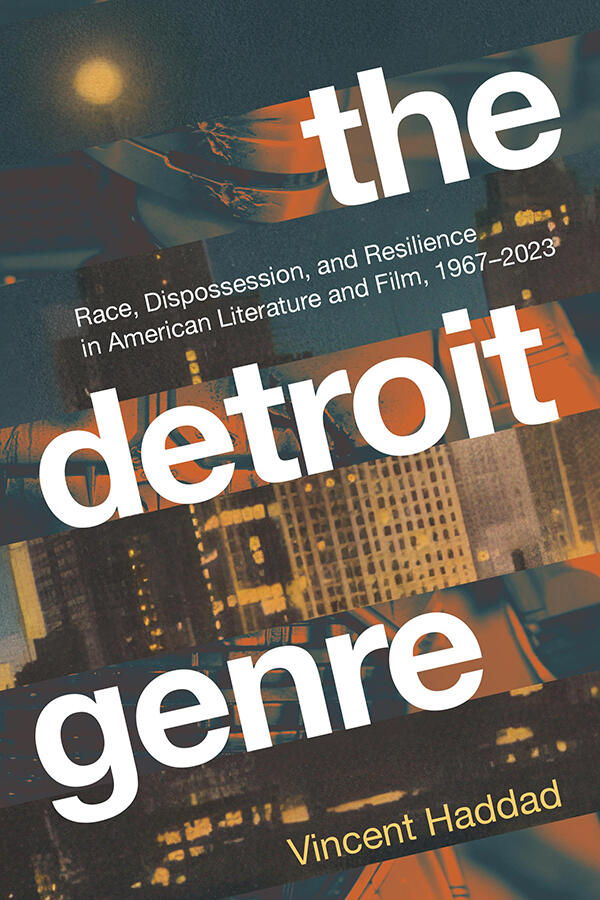
Central State University professor opens dialogue on ‘Detroit genre’ with new book

Vincent Haddad, Ph.D., Associate Professor of English at Central State University, was recently interviewed on a Michigan NPR podcast, Stateside with April Baier, on his new open-access book, The Detroit Genre: Race, Dispossession, and Resilience in American Literature and Film, 1967–2023.

Dr. Haddad’s book examines Detroit’s role as a focal point for American popular culture, uncovering its profound influence on literary and genre storytelling. Through the lens of genres such as post-apocalyptic, dystopian, crime fiction, horror, and superhero narratives, Dr. Haddad explores how Detroit has become central to America’s cultural imagination, while often reinforcing harmful tropes of dispossession and resilience.
The professor brings both his scholarly expertise and personal connection as a native Detroiter to the book. Dr. Haddad illustrates how Detroit has been represented, deconstructed, and reclaimed across popular media — from Robocop and The Crow to Kathryn Bigelow’s Detroit and the horror hits It Follows and Barbarian.
The book establishes the concept of the “Detroit genre,” tracing its roots to late-1960s portrayals of the city that centered white, often suburban, perspectives. These narratives depicted Detroit as a site of crime, abandonment, and ruin — reinforcing systemic misconceptions about who belongs in the city.
Growing up in the 1990s in suburban Detroit, Dr. Haddad said he believed at one point that all sitcoms were set in and around Detroit, using examples of popular TV shows like Home Improvement, Sister, Sister, Martin, and Freaks and Geeks.
Dr. Haddad points to texts like the sitcom Sister, Sister as emblematic of how suburban perspectives were conditioned to view Detroit’s urban space with suspicion. Conversely, Martin, a sitcom set within Detroit’s internal spaces, highlighted the failures of systems like housing infrastructure and gave agency to its characters to expose injustices.

The reason that Detroit is so important to these genre stories is because Detroit has been so important to the broader American imaginary.
Vincent Haddad, Ph.D.Associate Professor of English
Dr. Haddad also highlights Black writers such as Alice Randall, adrienne maree brown, Angela Flournoy and Stephen Mack Jones, who reclaimed and revised Detroit’s story. By experimenting with genre conventions, these authors disrupt narratives of resilience that implicitly blame individuals for systemic failures, such as water shut-offs or foreclosures.
In his Stateside interview, Dr. Haddad elaborates on the “conditioning” inherent in genre portrayals of Detroit. Reflecting on childhood episodes of Sister, Sister, he discusses how laugh tracks and narrative framing train viewers to perceive Detroit through a lens of fear, dispossession, and racialized othering. Similarly, in texts like Barbarian, horror narratives exploit themes of abandoned property and “right-sizing” strategies — urban policies that cut services in historically Black neighborhoods — to generate fear.
Dr. Haddad draws on scholars like Kyle T. Mays, who theorizes how dispossession narratives rationalize exclusion, and critiques the myth of “resilience,” which often masks systemic injustice. While resilience narratives celebrate individuals who “adapt” to adversity, Dr. Haddad argues that such stories obscure the broader forces — like redlining, disinvestment, and foreclosure — that require communities to endure such challenges.
In highlighting the significance of Detroit’s role in America’s cultural imaginary, Dr. Haddad underscores how the city serves as a mirror of the nation’s triumphs and failures. For his students at Central State University, Detroit becomes a model for understanding the representation of their own hometowns, connecting rural Virginia or Dayton to themes of resilience, dispossession, and cultural identity.
Ultimately, The Detroit Genre challenges readers to reckon with the city’s history while imagining new futures for Detroit — ones rooted in Black liberation rather than narratives of decay or exploitation. This groundbreaking book invites scholars, readers, and Detroiters alike to reexamine the stories told about America’s Motor City and the systems those stories uphold.
The Detroit Genre: Race, Dispossession, and Resilience in American Literature and Film, 1967–2023, published by Lever Press, is available to download for free here.
For interested students, Dr. Haddad will teach ENG 4090, “The Detroit Genre,” this spring.


